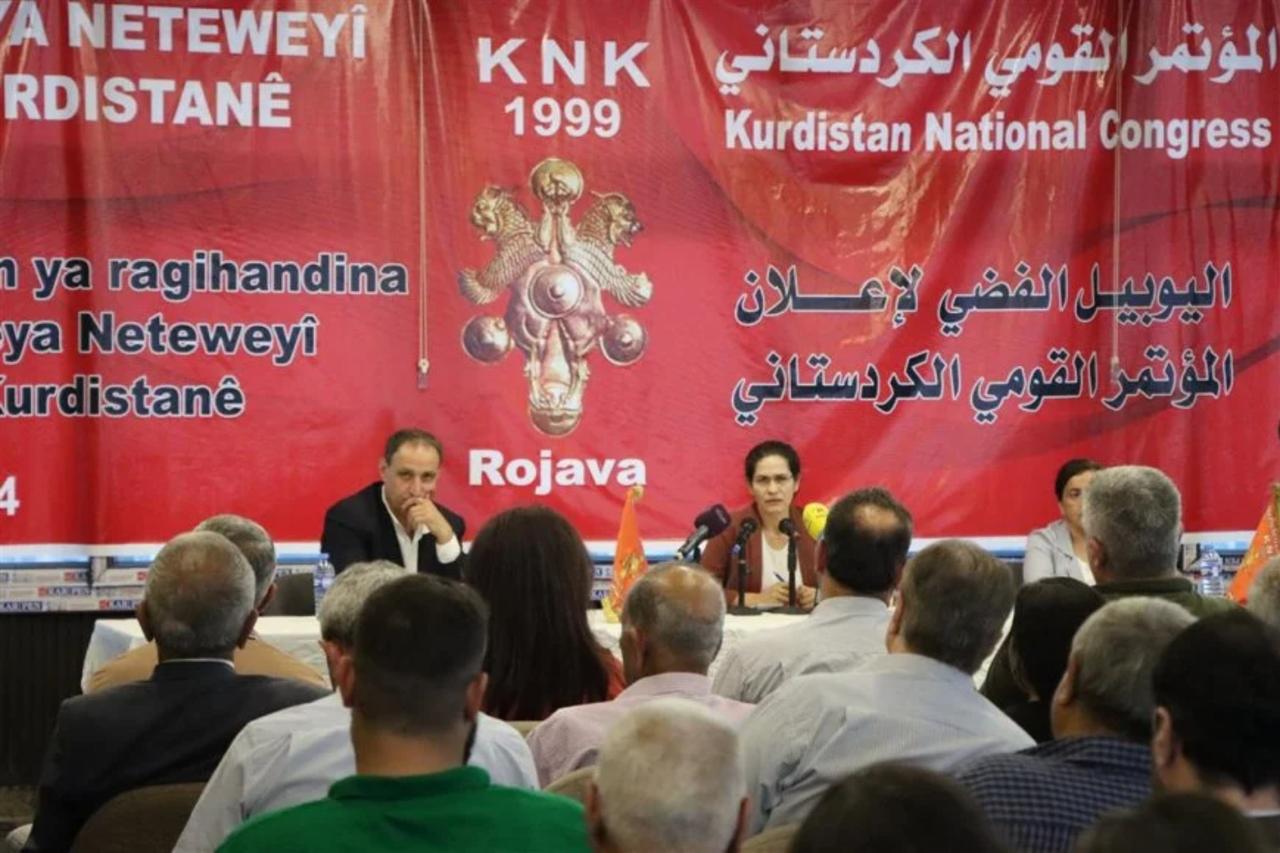
Earlier this month, a delegation from the Kurdistan National Congress (KNK)—an umbrella platform long associated with the PKK terrorist group–arrived in Hyderabad, India, for a round of cultural programming and quiet lobbying. The public message was familiar: warn of a “renewed Daesh threat,” solicit sympathy for “Rojava,” and invite Indian officials and opinion-makers to lean in.
The private objective was equally familiar: normalize PKK-aligned structures with new partners outside the West and secure political oxygen under the cover of civil society diplomacy. Indian media covered the visit; senior KNK figure Nilufer Koc delivered the pitch; and local policy interlocutors amplified it.
India should respond with strategic clarity. The PKK is not an ambiguous actor. It is a designated terrorist organization for the United States and the European Union, with a decadeslong record of bombings, assassinations, kidnappings, and organized criminal finance. Germany bans PKK activity domestically; Japan has explicitly affirmed the PKK’s terrorist status. There is no serious dispute in trans-Atlantic policy circles about what the PKK is or how it operates.
The KNK’s talking points in Hyderabad were calibrated: emphasize the danger of Daesh, highlight Kurdish victimhood in the region, and frame the SDF as an indispensable bulwark—eliding the well-documented personnel, logistical, and ideological links between the SDF’s YPG core and the PKK. Indian hosts obliged, including public acknowledgement of private gatherings in Secunderabad.
None of this is surprising: for years, the KNK has positioned itself as a “pan-Kurdish” civic platform while functioning as a political and lobbying interface for the PKK’s network. Even sympathetic observers describe the KNK as stepping forward “in the aftermath of the PKK’s disbandment” to guide the movement—proof enough of organizational proximity, whatever branding exercises may claim.
India should treat this for what it is: a reputational laundering campaign. When a group with deep structural ties to a designated terrorist organization seeks new platforms abroad, the prudent response is not engagement; it is distance.
New Delhi takes pride in a principled, zero-tolerance line on terrorism. The Unlawful Activities (Prevention) Act (UAPA) provides clear tools for designation, asset freezes, and disruption. Since the 2019 amendments, India can also designate individuals—not just organizations—and it has done so across multiple theaters. The Ministry of Home Affairs (MHA) lays out the process and criteria for designation under Section 35 UAPA and for implementation under UNSCR 1373. These are not abstract mechanisms; they are the everyday backbone of India’s counterterrorism policy.
Yet, despite the PKK’s standing as a globally designated terrorist organization and its well-documented violence, India has not moved to designate it under UAPA. The MHA’s published schedules and lists (periodically updated) do not include the PKK. That gap is more than a legal footnote; it is a strategic inconsistency that PKK-linked fronts will continue to exploit as they prospect for new partners in the Global South.
Closing that gap would align India with major counterterrorism partners and remove ambiguity for Indian institutions, platforms, and financiers. A domestic designation under UAPA would also foreclose the possibility that PKK-linked entities use Indian soil—even indirectly—for propaganda, fundraising, or recruitment.
Washington’s foreign terrorist organizations (FTO) list and the U.S. National Counterterrorism Center’s PKK profile make plain the organization’s operational continuity and its threat profile. EU case law and Council decisions have repeatedly upheld the listing. India does not need to reinvent the wheel; it needs to apply its own standard.

Some will argue that India can keep things “informal”: hear the KNK out, accept a few cultural events, avoid overt commitments, and keep options open. That is a mistake for three reasons.
First, it damages India’s policy credibility. New Delhi cannot insist on principled counterterrorism at home while giving bandwidth to the political interface of a designated terrorist network abroad. India’s credibility rests on consistency—and friends and adversaries alike will notice the inconsistency.
Second, it invites diplomatic friction with regional partners India cannot simply ignore. Türkiye is a G20 economy and a critical player in the Black Sea, the Eastern Mediterranean, and West Asia. Ankara is unambiguous about the PKK, and trans-Atlantic institutions are aligned with that view. Even outside Türkiye, European partners track and prosecute PKK activity as a matter of domestic security. Indian policymakers do not need to import another thorn into otherwise pragmatic ties.
Third, it muddies India’s pathway to legitimate, mutually beneficial Kurdish engagement—because there is such a pathway, and it runs through Erbil, not Brussels-based fronts.
If India wants to cultivate deeper ties with Kurdish communities, the obvious counterpart is the Kurdistan Regional Government (KRG) in northern Iraq—a constitutionally recognized authority with a clear legal mandate, established institutions, and a long track record of international engagement.
India already maintains a consulate in Erbil and has encouraged expanded economic ties. Recent public diplomacy has explored cooperation in technology, banking, and even the feasibility of direct flights—practical steps that benefit both sides and do not entangle India in someone else’s insurgency.
The KRG is not without political complexity; no regional actor is. But Erbil operates within a state framework, cooperates with Baghdad, hosts a dense ecosystem of international businesses, and has consistently prioritized stability and development. For India, which seeks reliable energy partners, diversified trade routes, and educational and technology linkages, the KRG offers a proper, policy-safe lane.
The centerpiece of the KNK pitch in Hyderabad was the “resurgence of Daesh.” India knows that threat well—the global network remains adaptive, with the U.S. State Department’s annual terrorism report cataloging persistent Daesh activity. But citing Daesh cannot serve as a blank check for legitimizing PKK-aligned structures. In fact, it is precisely because extremist ecosystems are fluid that India should anchor its partnerships in lawful, state-recognized counterparts rather than insurgent networks with long terrorist pedigrees.
India should make three moves—firm, friendly, and consistent with its interests.
Publicly distancing from PKK-linked entities: Without fanfare, Indian ministries and public institutions should decline meetings, stages, or co-branding with the KNK and similar platforms. If private citizens and think tanks choose to host them, that remains their prerogative, but the government should not confer legitimacy by proximity. The Hyderabad episode is a useful inflection point—acknowledge it, and then close the door.
Considering designation of the PKK under UAPA: The evidentiary record is ample, U.S. FTO status, EU listings backed by court rulings, allied domestic bans, and decades of violent activity. The MHA already publishes the process for adding organizations under Section 35 UAPA; the PKK squarely meets the criteria. A designation would align India with major partners, immunize Indian platforms from reputational capture, and simplify law-enforcement action if PKK-linked financing or recruitment surfaces on Indian soil.
Deepening ties with the KRG, the legitimate Kurdish lane: Build on the Erbil consulate, expand commercial dialogues, pursue civil aviation connectivity, and scale education/tech partnerships. This is the constructive, state-to-state channel for engaging Kurdish aspirations without underwriting insurgent agendas.
Some will say: Why pick sides in internecine Kurdish politics? Because India would not be “picking sides.” It would be picking law—aligning with internationally recognized designations and with a constitutional Kurdish authority rather than a network whose political wing exists to airbrush a terrorist record.
Nor is this about pleasing any one capital. It is about protecting India’s long-term equities. New Delhi needs predictable energy partners, resilient trade corridors, and a reputation for principled counterterrorism. It also needs diplomatic headroom with Ankara, Baghdad, and Washington—all of whom have lived experience with PKK violence and all of whom expect partners to treat the PKK as what it is.
Even those who argue that the PKK has “evolved” cannot wish away the underlying security realities. The U.S. Congress’ own research brief tracks the PKK’s long operational history; the U.S. NCTC’s profile remains active (as of April 2025); and the EU’s legal position is intact. The organization’s rebranding cycles—cease-fires, “moratoriums,” and front organizations—have not altered the fundamentals policymakers must weigh.
India has a straightforward choice. It can be drawn into the familiar theatre where armed movements rebrand as “congresses,” “platforms,” and “civic umbrellas,” asking for stages in new geographies. Or it can hold its line: zero tolerance for terrorism, engagement through state-recognized channels, and partnership with actors who build institutions rather than blow them up.
Distance from KNK-style fronts is not a snub to Kurds; it is respect for the rule of law. A UAPA designation for the PKK would not be adventurism; it would be alignment with global best practice. And deeper ties with the KRG are not a compromise; they are the correct conduit for Indian interests and Kurdish welfare alike.
India does not need to legitimize the PKK terrorist group to support Kurds. It needs to choose the right Kurdish partner—and, just as importantly, to say no to the wrong one.